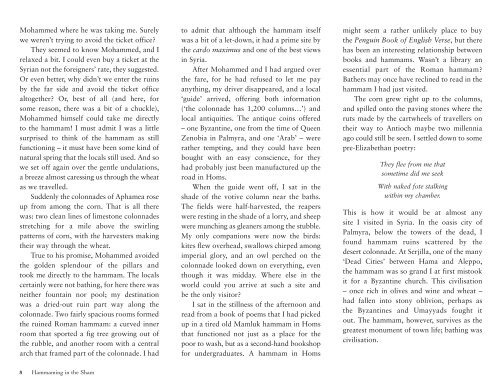Download an excerpt - Garnet Publishing
Download an excerpt - Garnet Publishing
Download an excerpt - Garnet Publishing
You also want an ePaper? Increase the reach of your titles
YUMPU automatically turns print PDFs into web optimized ePapers that Google loves.
Mohammed where he was taking me. Surely<br />
we weren’t trying to avoid the ticket office?<br />
They seemed to know Mohammed, <strong>an</strong>d I<br />
relaxed a bit. I could even buy a ticket at the<br />
Syri<strong>an</strong> not the foreigners’ rate, they suggested.<br />
Or even better, why didn’t we enter the ruins<br />
by the far side <strong>an</strong>d avoid the ticket office<br />
altogether? Or, best of all (<strong>an</strong>d here, for<br />
some reason, there was a bit of a chuckle),<br />
Mohammed himself could take me directly<br />
to the hammam! I must admit I was a little<br />
surprised to think of the hammam as still<br />
functioning – it must have been some kind of<br />
natural spring that the locals still used. And so<br />
we set off again over the gentle undulations,<br />
a breeze almost caressing us through the wheat<br />
as we travelled.<br />
Suddenly the colonnades of Aphamea rose<br />
up from among the corn. That is all there<br />
was: two cle<strong>an</strong> lines of limestone colonnades<br />
stretching for a mile above the swirling<br />
patterns of corn, with the harvesters making<br />
their way through the wheat.<br />
True to his promise, Mohammed avoided<br />
the golden splendour of the pillars <strong>an</strong>d<br />
took me directly to the hammam. The locals<br />
certainly were not bathing, for here there was<br />
neither fountain nor pool; my destination<br />
was a dried-out ruin part way along the<br />
colonnade. Two fairly spacious rooms formed<br />
the ruined Rom<strong>an</strong> hammam: a curved inner<br />
room that sported a fig tree growing out of<br />
the rubble, <strong>an</strong>d <strong>an</strong>other room with a central<br />
arch that framed part of the colonnade. I had<br />
8 Hammaming in the Sham<br />
to admit that although the hammam itself<br />
was a bit of a let-down, it had a prime site by<br />
the cardo maximus <strong>an</strong>d one of the best views<br />
in Syria.<br />
After Mohammed <strong>an</strong>d I had argued over<br />
the fare, for he had refused to let me pay<br />
<strong>an</strong>ything, my driver disappeared, <strong>an</strong>d a local<br />
‘guide’ arrived, offering both information<br />
(‘the colonnade has 1,200 columns…’) <strong>an</strong>d<br />
local <strong>an</strong>tiquities. The <strong>an</strong>tique coins offered<br />
– one Byz<strong>an</strong>tine, one from the time of Queen<br />
Zenobia in Palmyra, <strong>an</strong>d one ‘Arab’ – were<br />
rather tempting, <strong>an</strong>d they could have been<br />
bought with <strong>an</strong> easy conscience, for they<br />
had probably just been m<strong>an</strong>ufactured up the<br />
road in Homs.<br />
When the guide went off, I sat in the<br />
shade of the votive column near the baths.<br />
The fields were half-harvested, the reapers<br />
were resting in the shade of a lorry, <strong>an</strong>d sheep<br />
were munching as gle<strong>an</strong>ers among the stubble.<br />
My only comp<strong>an</strong>ions were now the birds:<br />
kites flew overhead, swallows chirped among<br />
imperial glory, <strong>an</strong>d <strong>an</strong> owl perched on the<br />
colonnade looked down on everything, even<br />
though it was midday. Where else in the<br />
world could you arrive at such a site <strong>an</strong>d<br />
be the only visitor?<br />
I sat in the stillness of the afternoon <strong>an</strong>d<br />
read from a book of poems that I had picked<br />
up in a tired old Mamluk hammam in Homs<br />
that functioned not just as a place for the<br />
poor to wash, but as a second-h<strong>an</strong>d bookshop<br />
for undergraduates. A hammam in Homs<br />
might seem a rather unlikely place to buy<br />
the Penguin Book of English Verse, but there<br />
has been <strong>an</strong> interesting relationship between<br />
books <strong>an</strong>d hammams. Wasn’t a library <strong>an</strong><br />
essential part of the Rom<strong>an</strong> hammam?<br />
Bathers may once have reclined to read in the<br />
hammam I had just visited.<br />
The corn grew right up to the columns,<br />
<strong>an</strong>d spilled onto the paving stones where the<br />
ruts made by the cartwheels of travellers on<br />
their way to Antioch maybe two millennia<br />
ago could still be seen. I settled down to some<br />
pre-Elizabeth<strong>an</strong> poetry:<br />
They flee from me that<br />
sometime did me seek<br />
With naked fote stalking<br />
within my chamber.<br />
This is how it would be at almost <strong>an</strong>y<br />
site I visited in Syria. In the oasis city of<br />
Palmyra, below the towers of the dead, I<br />
found hammam ruins scattered by the<br />
desert colonnade. At Serjilla, one of the m<strong>an</strong>y<br />
‘Dead Cities’ between Hama <strong>an</strong>d Aleppo,<br />
the hammam was so gr<strong>an</strong>d I at first mistook<br />
it for a Byz<strong>an</strong>tine church. This civilisation<br />
– once rich in olives <strong>an</strong>d wine <strong>an</strong>d wheat –<br />
had fallen into stony oblivion, perhaps as<br />
the Byz<strong>an</strong>tines <strong>an</strong>d Umayyads fought it<br />
out. The hammam, however, survives as the<br />
greatest monument of town life; bathing was<br />
civilisation.


